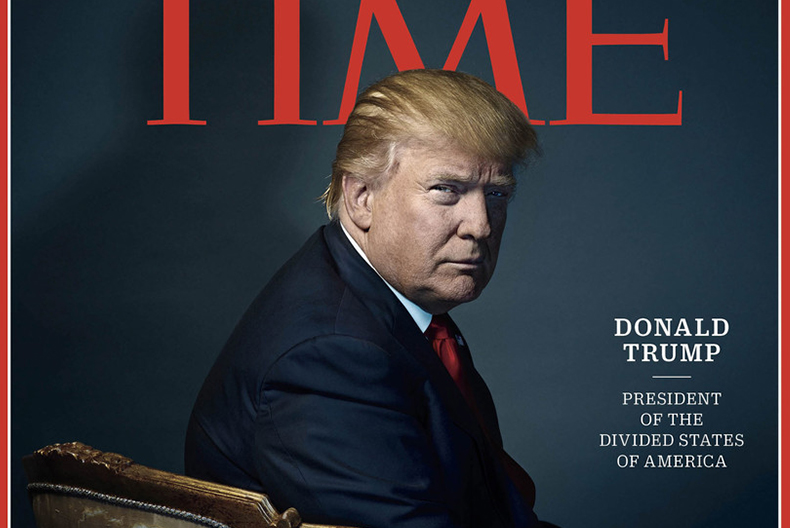
Image credit: Time
TODAY, more than ever before, it’s important that we do as much as we can to stop the normalization of Donald Trump in the media and in our homes. Whatever has happened in the last few hours, days, or weeks to outrage and harm us, no matter how far we are into Trump’s tenure as president, our mission remains the same.
At the time of this writing, it’s disheartening to know that Time has named Trump its Person of the Year for 2016. I can’t think of a stronger declaration of his normalcy. The same honor has been bestowed upon a number of authoritarians in the past, including Adolf Hitler in 1938 and Joseph Stalin in 1939 and 1942, and, each and every time, the honoree’s brutality and malice were normalized. From 1938:
Herr Hitler reaped on that day at Munich the harvest of an audacious, defiant, ruthless foreign policy he had pursued for five and a half years. He had torn the Treaty of Versailles to shreds. He had rearmed Germany to the teeth — or as close to the teeth as he was able. He had stolen Austria before the eyes of a horrified and apparently impotent world.
Perhaps you are tired of hearing Trump compared to Hitler. I am, too. At one point in time, Godwin’s Law would label this a rhetorical fallacy, the use of which would automatically relegate this article to the trash heap of illogical arguments. But Mike Godwin himself recognized that legitimate comparisons to the Third Reich could be made when talking about politics. Even without Godwin’s input, the idea that we can’t invoke the specter of Nazism in contemporary politics went out the window when we started seeing actual Nazis interviewed on cable news. So yes, when it’s appropriate, I’m going to compare Trump’s rhetorical strategies, his bigotry, and his voter base to those of Hitler and interbellum Germany.
In this case, however, comparison of the Time articles shows, not so much that Trump and Hitler are alike, but that they were both normalized in their time. The 1938 write-up on Hitler, and all we know of its aftermath, proves just how dangerous even momentary normalization can be.
Reading Time‘s coverage of Trump, you can almost hear the internal scream behind it: This is not normal. But even Time glosses over Trump’s demagoguery, in ways that border on praise, and will certainly be read as such by his supporters. From the cover story:
Now it’s difficult to count all the ways Trump remade the game: the huckster came off more real than the scripted political pros. The cable-news addict made pollsters look like chumps. The fabulist out-shouted journalists fighting to separate fact from falsehood. The demagogue won more Latino and black votes than the 2012 Republican nominee.
This is exactly what New Yorker editor David Remnick was talking about when he called for us to stop normalizing Trump during a CNN interview. Remnick called out those people and publications who characterized Trump like any other candidate, “as someone in absolute possession of policy knowledge, as someone who somehow is in the acceptable range of rhetoric.”
Drawing from Remnick’s warnings, LitHub highlights The New York Times‘ normalization of Steve Bannon — the former executive chair of Breitbart News, whom Trump named his chief strategist and Senior Counselor — as a “right-wing provocateur.” Bannon has been called many things, but that may be the mildest. Until recently, it was acceptable to label him and his cabal as “alt-right,” because we all knew the kind of fringe xenophobia and misogyny that lurked in that dark corner of the Internet, how it overlapped with meninists, militias, and GamerGate.
But today, “alt-right” doesn’t go as far as it used to. Trump’s election has proven that the alt-right, rather than being a fringe movement, are — at least as a voting bloc — an acceptable alternative to mainstream conservatism and libertarianism. We know that this isn’t true, that what we have heretofore called “alt-right” is rabid white supremacy, and that everything it stands for is antithetical to our American values. And so, we must change our tactics to match the new problem.
Before, the issue with Bannon and other avowed white supremacists was that they existed. Now, it’s that they have been legitimized in Washington. We cannot continue using the same language to describe these people and their ideas, because that language, like it or not, will clearly not — as Ijeoma Oluo puts it — “create a culture that won’t vote for Trump.” Defanged tactics will not suddenly become effective because we will them to be.
The simplest and most obvious way we can stop normalizing Donald Trump and his ilk is to stop talking about them in polite terms. We stopped calling anti-choice people “pro-life” when it became clear they were nothing of the sort. It’s time to do the same with Trump’s supporters.
















